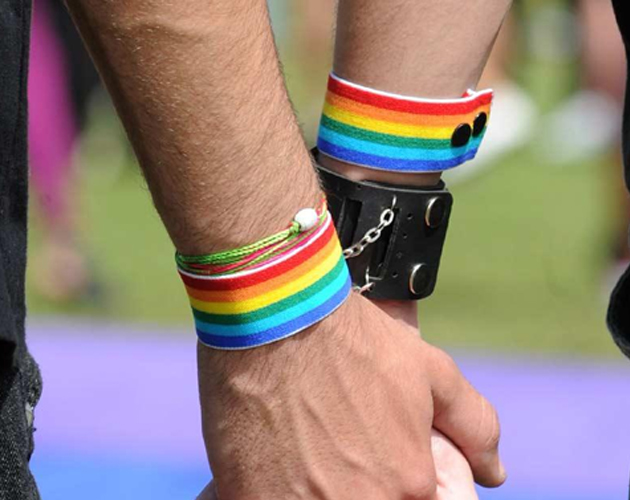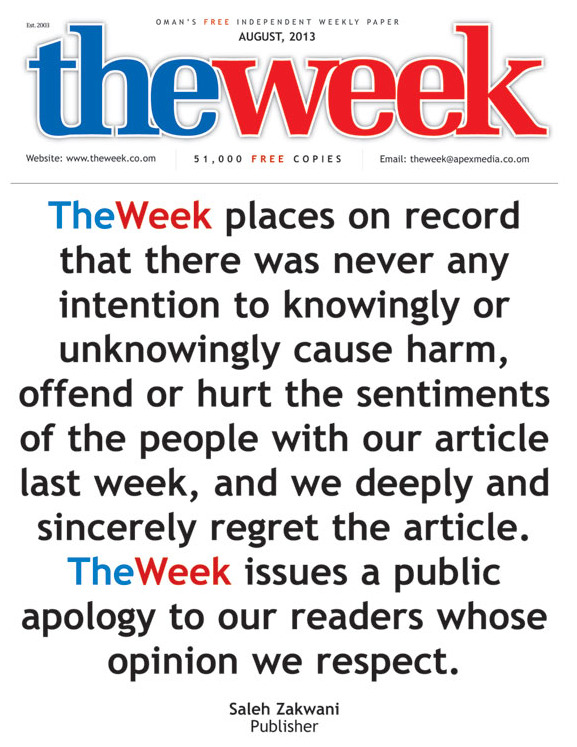Un periódico en Omán, obligado a pedir disculpas por hablar de homosexuales

Un periódico en Omán, obligado a pedir disculpas por hablar de los gays: The Week tiene que disculparse por un artículo solidario con los homosexuales, que ha tenido que retirar.
Este diario en inglés publicó un artículo donde hablaban de la homosexualidad en el país, contando las vivencias de varios gays y lesbianas en una escena homosexual muy alternativa que pasa prácticamente desapercibida, y también la experiencia de un psicólogo hablando de pacientes homosexuales que le visitan para que les curen. Está claro que ser gay en este país no es fácil: la homosexualidad en Omán se castiga con pena de cárcel de entre 6 meses y 3 años, así que resulta muy extraña que se hable de gays en los medios, y menos de manera favorable.
El equipo Lotus de Fórmula 1, obligado a pedir perdón por defender a los gays
¿Cómo pedir disculpas a una mujer orgullosa?
Aun así, este artículo de The Week ha causado una gran polémica en Omán: en las redes sociales se denunciaba diciendo que promovía algo ilegal en el país como es la homosexualidad, e incluso la asociación de periodistas de Omán pidió al gobierno que tomara medidas contra el periódico. Pocos omanís se atrevieron a tuitear que el artículo simplemente documentaba una realidad, aunque sea incómoda de aceptar para muchos.
Por eso, The Week se ha visto obligado a retirar el artículo y pedir disculpas pública y oficialmente: "Nunca tuvimos la intención de ofender o herir los sentimientos de la gente con nuestro artículo (...) Pedimos perdón a nuestros lectores, cuya opinión respetamos". ¿Es o no es increíble? Si entras a la web de The Week, que probablemente acabe cerrando tras esta polémica, verás antes de nada esta enorme disculpa, simplemente por hablar de homosexuales. Despues de ella, te dejamos al completo con el artículo que se había publicado, a ver si te parece tan grave.

El artículo del diario omaní The Week:
When Haitham (name changed on request) had his first same-sex encounter with his cousin, he was only about eight years old. It was only a few fleeting moments on a camping trip with some family members close to his native village just outside Muscat. “But those few moments continued to haunt my memory for the longest time,” said the 23 year old.
He spent the next nine years of his life wondering about that night and the recurring feelings he tried hard to bury under his externally happy demeanour. “I did not know what to make of it. My friends and I shared many passions like cars and football. But I just couldn’t share their enthusiasm for the opposite sex and that was eating away at my insides. I couldn’t talk to anyone about the fact that I, in fact, liked men.”
That was the last encounter Haitham had till he turned 17 years old when he started activ-ely seeking others like him. “Till then I thought there was something wrong with me. But then I could tell there were other people that I met and knew who were definitely going through the same thing. We never talked about it since it would be absolutely unimaginable to do that but it gave me heart that I wasn’t alone,” he said. His cousin went on to get married and Haitham said, that experience, to him was merely a sexual encounter. “Since there weren’t any girls around, he fooled around with me. But that chance encounter helped me eventually recognise who I was.”
Elena, an expatriate feels Oman is very different from any other country in the Middle East. “And this has a lot to do with the tolerance that this country shows in comparison with countries like Saudi Arabia or even the UAE,” she explained. She is relatively new to Oman and she had her reservations when she was offered a job in this country. “When I was thinking about moving here, part of me wanted to make the move for my career while the other half was very sceptical about how I would cope with my sexuality in a conservative Islamic country like Oman. After all, you hear horror stories coming out of countries like Saudi Arabia.” But she did some research that put her at ease. “I was told by several people who had been here and I did my own research on the Internet and found out that life wasn’t that hard for people of different sexual orientations in Oman.”
This paints a picture of a country very different from the one known to most of the world. As an Islamic nation, the sultanate is steeped in tradition and religion. “It is not hard to find men to date here in Oman if you know where to look,” said Haitham. He currently lives in Muscat and prefers dating expatriates. “I dated two Omani men close by my village but people started gossiping and I didn’t want my family to be embarrassed. After all, every one in Oman knows someone who knows someone. If I date expatriates, it eliminates that risk.”
Haitham is not the only one to be worried about his sexuality and the repercussions of people finding out about his sexual preference. “I know a lot of men who are married and have children but lead double lives. I don’t know if their wives know that they also see other men. Coming out is often seen as a very Western concept and is not realistic in a society like Oman,” he said. Even Haitham has to keep up appearances. “I cannot be perceived to be different and so I also send flirty text messages and pretend to be interested in girls.”
For an expatriate like Jason, being gay in Oman is not a problem as long as he is discreet about it. “Back home I could be myself, but I have to recognise the realities on the ground here,” he said. He likes to date Arab men because that, to him, is a guarantee of discretion. “They usually have appearances to keep up and so it is in their interest to keep it discreet. Elena talked about communicating through eye contact. “There is this game gay people play with their eyes – they know what is happening between them and it’s a quiet nod of acknowledgement. This happens the world over and you see it just as often here in Oman as well, even if the women are covered.”
Jason and Haitham’s desire for discretion can be understood because to risk upsetting the sexual status quo in this country can often lead to serious legal and social ramifications. Same-sex relations are forbidden by Article 223 of the Omani Penal Code of 1974 and transgressions enough to constitute a ‘public nuisance’ can result in a prison term anywhere from six months to three years. But for Harry, it is the social repercussions that are more real.
“In Oman, you can live life the way you want to and as long as you don’t draw too much attention to yourself, you won’t be bothered by the law. But walking down the street is a whole different story,” he said. He dresses flamboyantly and occasionally wears make up. “I live in Al Khuwayr and try walking down there without someone yelling something obscene and rude from their cars. It is hurtful and although it happens all the time and I try to ignore it, it still upsets me just as much as the first time it happened.”
Dr Gerald D’Costa is a clinical psychiatrist working in Badr al Sama’a hospital in Ruwi and sees a number of patients who come to him because they are conflicted about their sexual orientation. “They buckle under societal, familial and religious pressures,” he explained. “Many of them come here looking for a cure or treatment. They think there is something wrong with their bodies, why they are feeling these things. They want so desperately to be like people they consider ‘normal’ that they cannot reconcile their own feelings with any sense of normality.”
But Gerald is still glad that his patients choose to speak with someone about what they are feeling. “Sadly that is only the tip of the iceberg. According to international statistics, six to ten per cent of any population in any country is gay and that would be a reasonable assumption for Oman as well. And if that is the case, it is a real shame that all these other people who are having trouble understanding what they are feeling are just not seeking any kind of help.”
He feels there is no need for youngsters like Haitham to feel alone. “I do understand that people are reticent about speaking to another individual about something so private. But now, they can connect with other people, just like them and seek solace in their experiences even if they are halfway across the globe. You can become part of online communities and groups of people like yourself, listen to other people, ask questions anonymously and realise you are not alone,” Gerald added.






